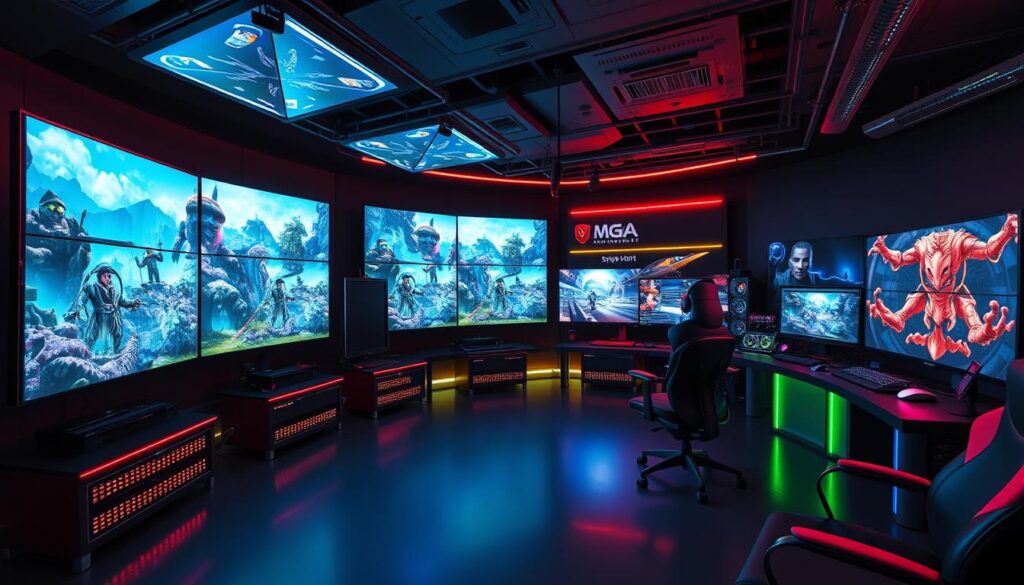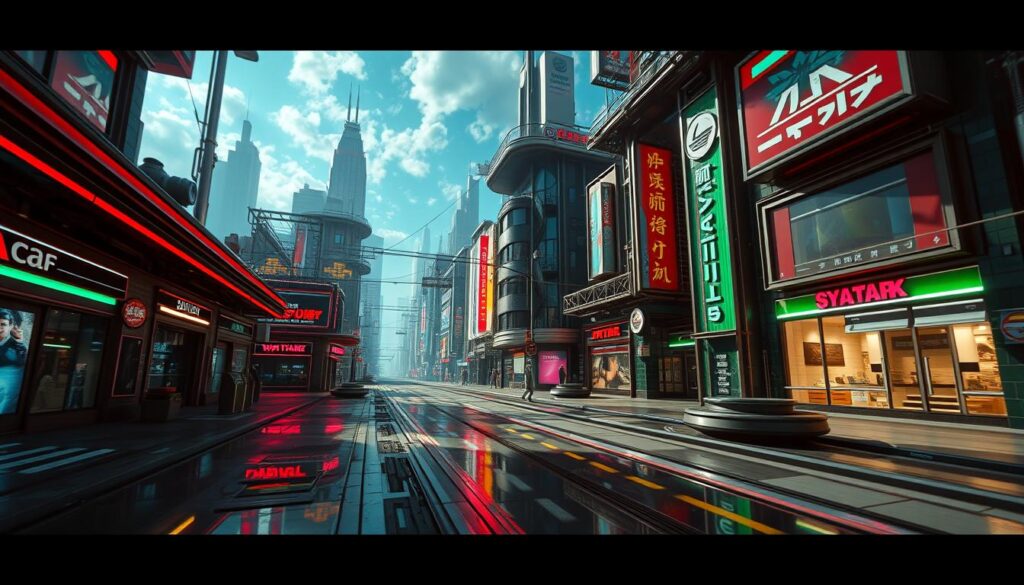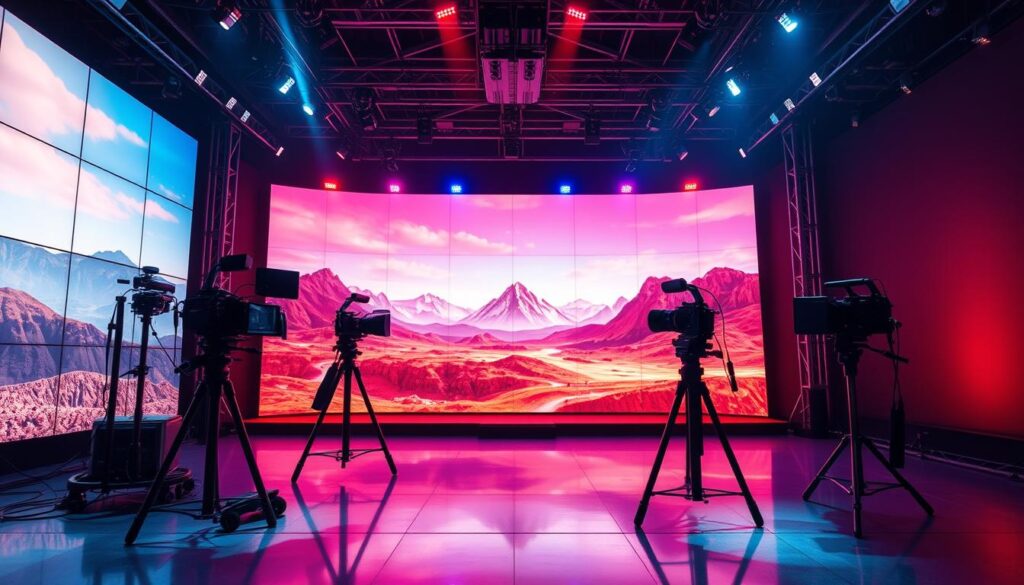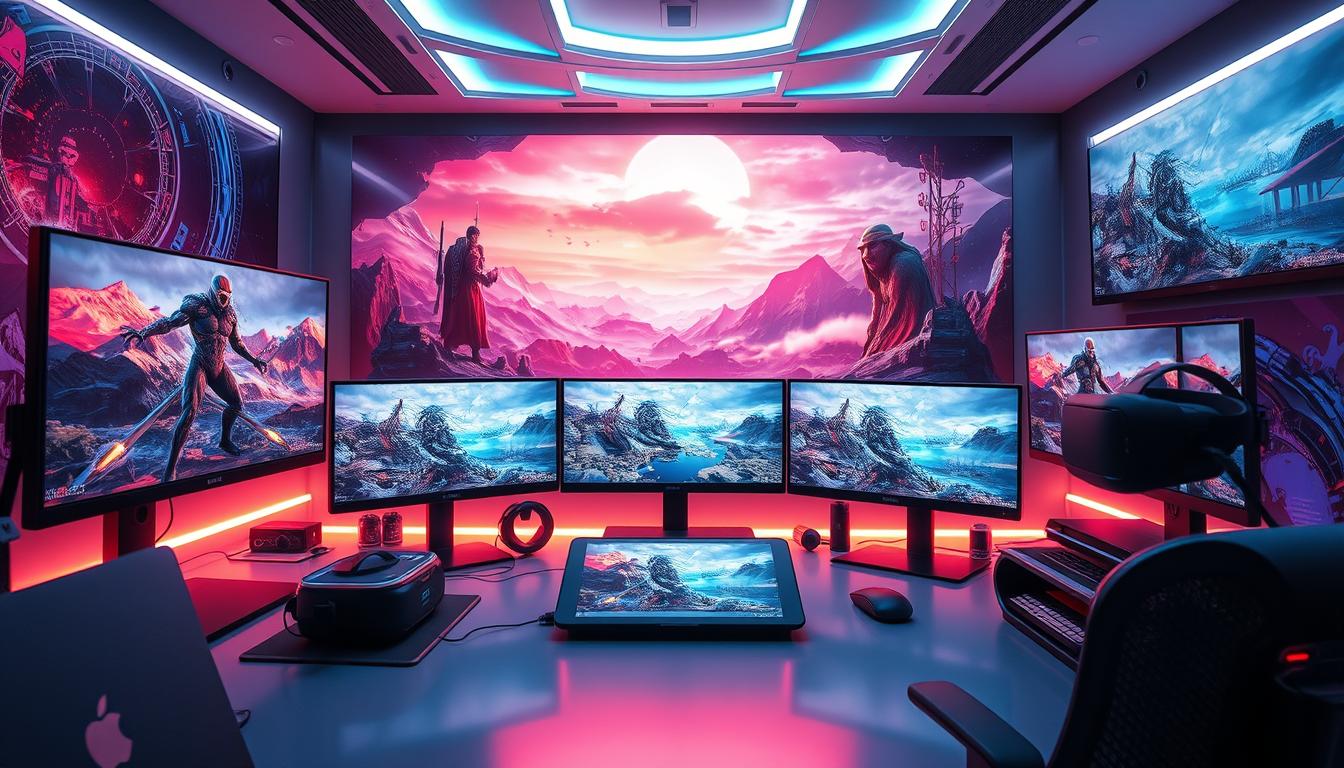Unreal Engine 5.3 is changing the game development world. It has won the hearts of developers all over. Eighty-five percent of the top games on console and PC use it. This shows Unreal Engine 5.3 is the top choice for making amazing games.
Our team has been diving into Unreal Engine 5.3’s features. We’re excited to share the big updates that are changing game development. These updates include better performance and new ways to make games look incredible.
Key Takeaways
- Unreal Engine 5.3 is the leading game development tool, used by 85% of top-grossing games
- The engine offers a wide range of advancements, including enhanced performance, graphics, and development workflow improvements
- Revolutionary real-time rendering capabilities with advanced ray tracing and Lumen technology
- Innovative Nanite virtualized geometry system for highly detailed and efficient game worlds
- Seamless integration of virtual production and cinematic tools for immersive game development
What’s New in Unreal Engine 5.3
Unreal Engine 5.3 is a big leap forward for developers. It has new features that meet the growing needs of gaming and virtual production. With better performance, graphics, and rendering, it’s set to change how we create games and virtual worlds.
Enhanced Performance Features
Unreal Engine 5.3 comes with features that boost performance. It has better memory management, faster asset loading, and advanced threading. These improvements help make open worlds and virtual productions smoother.
Graphics and Rendering Updates
The new Unreal Engine has made huge strides in graphics and rendering. It has better lighting, materials, and visual effects. These updates help developers create stunning virtual environments and movies.
Development Workflow Improvements
Unreal Engine 5.3 also makes development easier. It has new tools for managing assets, working together, and building projects. These changes help teams work better and focus on creativity.
With Unreal Engine 5.3, developers can explore new possibilities in real-time rendering, virtual production, and open world development. It’s a game-changer that gives creators the tools to innovate.
Revolutionary Real-time Rendering Capabilities
At the heart of Unreal Engine 5.3 is its amazing real-time rendering. It lets game developers make graphics that feel real and immersive. This tech makes virtual worlds look almost like reality.
The engine uses the latest in GPU tech to render scenes fast. It makes complex 3D worlds and characters look great without slowing down. This means games feel smooth and fun to play.

Unreal Engine 5.3 can make photorealistic graphics right as you play. It uses advanced shading and lighting to make scenes look real. Players feel like they’re in a world that’s almost as real as their own.
“Unreal Engine 5.3’s real-time rendering capabilities are a game-changer, allowing us to push the boundaries of what’s possible in game development. The level of visual fidelity we can achieve is simply astounding.”
Thanks to these new rendering tools, developers can make games that are both beautiful and engaging. The future of gaming looks incredibly bright with these advancements.
Advanced Ray Tracing and Lumen Technology
Unreal Engine 5.3 is a game-changer in game development. It uses advanced ray tracing and Lumen technology. This system creates photorealistic graphics, making games look amazing.
Global Illumination Systems
The Lumen system is at the core of this innovation. It uses ray tracing to mimic light’s natural behavior. This results in realistic lighting that makes games feel more real.
Dynamic Lighting Solutions
Unreal Engine 5.3 says goodbye to static lighting. Its ray tracing allows for dynamic lighting that changes with the game’s environment. This means lighting that’s always right, whether it’s sunlight or indoor lighting.
Performance Optimization Techniques
Even with stunning graphics, Unreal Engine 5.3 doesn’t forget about performance. It offers ways to keep games running smoothly on different devices. This ensures a great gaming experience on many platforms.

Nanite Virtualized Geometry System
The Nanite Virtualized Geometry System is at the core of Unreal Engine 5.3’s new features. It lets game developers make graphics that look incredibly real. With Nanite, they can create detailed 3D worlds without slowing down the game.
This system changes how game worlds are made. It makes it easy to add detailed assets to games. Nanite handles the complexity of the geometry, so games run smoothly on many devices. Now, games can have amazing visuals and still let players explore big, open worlds.
“Nanite is a game-changer for the industry, redefining what’s possible in terms of photorealistic graphics and open-world development. It’s a testament to the ongoing innovation within Unreal Engine 5.3.”
With Nanite, game makers can do more than ever before. They can add small details and big landscapes. The Nanite system helps them make games that look amazing and feel real.
Virtual Production and Cinematic Tools
Unreal Engine 5.3 is changing the game in virtual production and cinematic tools. It lets filmmakers and creators explore new heights. With its advanced real-time rendering and photorealistic graphics, it’s perfect for stunning in-camera effects and immersive virtual sets.
In-Camera Visual Effects
Unreal Engine 5.3’s real-time rendering engine is now part of filmmaking. This means directors and cinematographers can capture detailed visual elements on set. No more long post-production times, making the process faster and more collaborative.
Real-time Previsualization
With Unreal Engine 5.3, filmmakers can see their ideas come to life instantly. This lets directors, producers, and visual effects teams make quick changes. They can refine their work in minutes, not weeks or months.
Virtual Set Creation
Unreal Engine 5.3 makes creating virtual sets easy and realistic. Teams can build detailed environments, from magical landscapes to futuristic cities. This approach is cost-effective and flexible, bringing creative visions to life.
Unreal Engine 5.3 is set to change the entertainment industry. It’s bringing a new era of filmmaking where the real and virtual blend. This opens up endless possibilities for storytelling.

MetaHuman Integration and Character Creation
In game development, making digital characters look real has been tough. But Unreal Engine 5.3 changes this with the MetaHuman Creator. This tool lets developers make Metahumans that look and act like real people, making games better.
The MetaHuman Creator uses new tech to make digital humans look and move like the real thing. This means game studios can make characters that look amazing, from their faces to how they move. It makes creating characters easier, so developers can focus on being creative.
One big plus of MetaHuman is it lets developers make many different characters. They can make characters that look like real people from all over the world or create unique avatars. This makes games more interesting and fun for everyone. It also makes making games faster and cheaper.
The gaming world is always getting better at making things look real, and Unreal Engine 5.3 is a big part of that. The MetaHuman tool makes making characters easier and makes them look more real. This makes games more exciting and pulls players into the game world.
Open World Development Features
Game developers love creating open-world games. Unreal Engine 5.3 makes this even better with new features. It has a World Partition system that helps manage big virtual worlds.
World Partition System
The World Partition system is a game-changer for open-world games. It breaks down the game world into smaller parts. This makes games run smoothly, even in huge worlds.
Large-Scale Environment Creation
Unreal Engine 5.3 lets developers make amazing, big game worlds. It uses advanced tech to keep quality high, even in huge environments. Developers can create everything from big cities to high mountains.
Performance Streaming Solutions
Keeping games running well is key, and Unreal Engine 5.3 does it. It loads and unloads assets smartly for a smooth game. This is a big win for open worlds, game development, and virtual production.
“Unreal Engine 5.3’s open-world features have truly revolutionized the way we approach game development. The level of scale, detail, and performance we can achieve is unlike anything we’ve experienced before.”
Cross-Platform Development and Deployment
In the world of game development, being flexible and accessible is key. Unreal Engine 5.3 makes a big step forward in this area. It offers strong cross-platform abilities that make it easier to develop and deploy games on many platforms and devices.
Developers can now create content for a wide range of platforms with Unreal Engine 5.3. This includes the latest consoles, PCs, mobile devices, and virtual production environments. The engine’s tools and optimizations help games built with Unreal Engine 5.3 run smoothly on different platforms. This makes streamlining the game development, open worlds, and virtual production workflows easier.
“Unreal Engine 5.3 has truly revolutionized the way we approach cross-platform game development. The ease with which we can now deploy our creations across diverse systems is a game-changer for the industry.”
Developers can use Unreal Engine 5.3’s built-in support for platform-specific features. This ensures their games use the best of each platform. This flexibility and optimization improve the user experience. It also lets developers reach more people, growing their game development, open worlds, and virtual production projects.
By using Unreal Engine 5.3’s cross-platform features, game developers can focus on making innovative games. They know their games will work well on many devices and platforms. This helps the game development, open worlds, and virtual production industries grow and evolve.
Conclusion
Unreal Engine 5.3 marks a major leap in game development. It brings photorealistic graphics, better performance, and easier workflows. These changes are set to change the world of interactive entertainment.
The Nanite system, advanced ray tracing, and Lumen technology are key. They allow developers to make games that look amazing and feel real. This means players get to experience games in a whole new way.
Unreal Engine 5.3 also makes working on games easier. It helps designers, cinematographers, and visual effects artists work together smoothly. With MetaHuman and new open-world tools, it’s the top choice for game developers.



